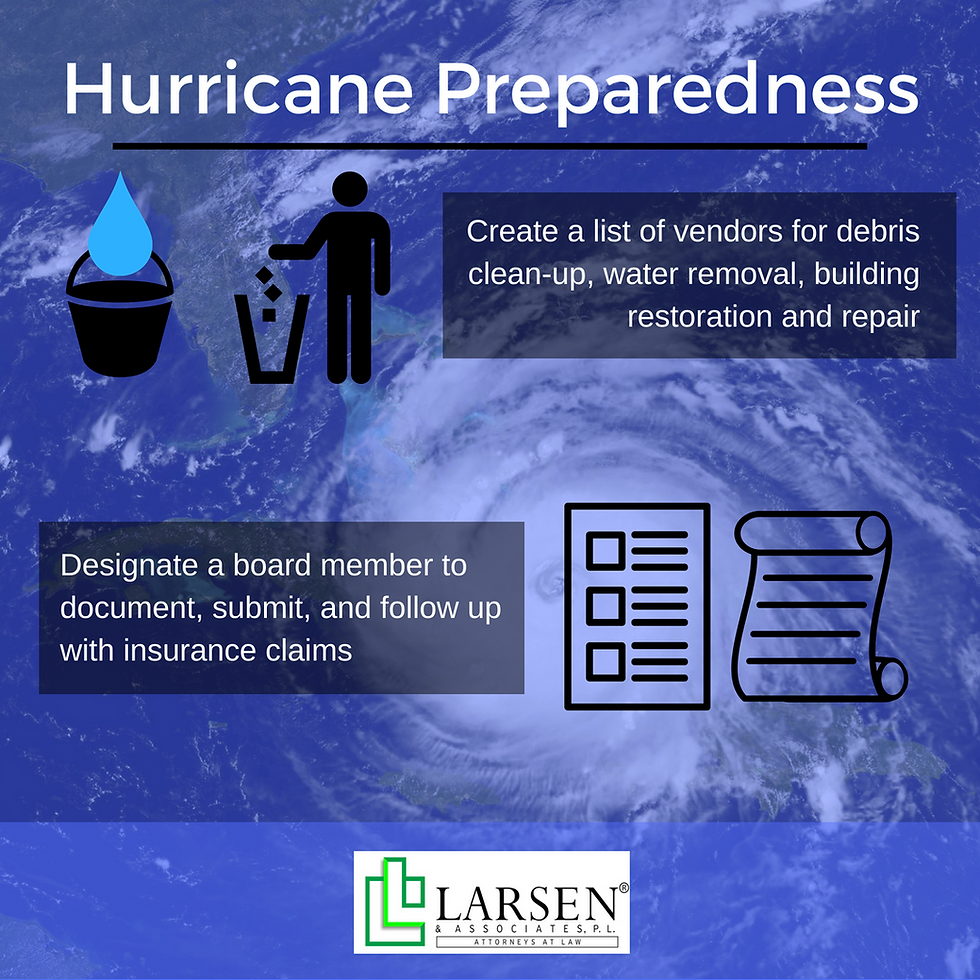11 Tips to Ensure Your Community Association is Prepared for Hurricane Season
- Larsen Slaten

- Aug 9, 2021
- 3 min read
With hurricane season right around the corner, it's hard to know for certain whether Mother Nature will quietly pass us by or rain down destruction this year.
One thing's for sure; it never hurts to be prepared for the worst.
Here are 11 tips to ensure your community association is prepared for this hurricane season.
1. Review and Update Plans and Procedures
When preparing for anything, it helps tremendously to have a plan of action. Discuss with the board, directors, and residents what to do in the event of a natural disaster.
If a hurricane is en route to your region, be diligent in tracking its path; staying tuned to news and radio broadcasts. If possible, consistently maintain your website with updates on the progress of the hurricane.
Communication between the board and residents in the community association will be invaluable. Designate a member of the board to be responsible for communicating with homeowners before and after the storm; keeping them updated on preparations, predictions, conditions, and restorations.

2. Document Property Conditions
Document, store, and backup records of property conditions prior to and following the hurricane.
Media such as photos and videos are powerful information that can be used for insurance claims.
Additionally, homeowners may be advised to create records of the state of their property before and after a perceived hurricane or severe weather storm.

3. Insurance
Make sure current required insurance policies are active and up-to-date before the hurricane is imminent.
Looking into additional insurance coverage may save your community association a lot of money and hassle.
If your homeowners are required to have personal insurance, remind them of this responsibility.
4. Common Area Preparation
Hurricanes bring with them strong winds and heavy rain that can cause significant damage to the common areas within your association.
Be sure common areas in the community are adequately prepared to withstand these forces by boarding up windows, moving loose and unsecured furniture, acquiring and placing sandbags, trimming any low-hanging or potentially destructive tree limbs, and safely securing important records and equipment.

5. Resident Notification
In the event of hurricane, it is important to notify all residents and homeowners with instructions for property preparation.
In much the same fashion as the common areas, they will likely need to remove porch or balcony furniture, secure windows or shutters, and place sandbags to negate flooding.

6. Emergency Contact Information
Be sure your contact information for all homeowners is current.
You may have residents who plan to leave their property during the hurricane, so creating a list of who is on-site and who has temporarily vacated can be beneficial.
Furthermore, ensure your association has access to all areas of the community in order to comprehensively assess damage following the storm.
7. Evacuation
Depending on the location and conditions of a hurricane affecting your community, your association may be required to evacuate.
The likelihood of evacuation is increased for homes and condos on the coast and in flood zones.
Develop procedures to employ in the event of an evacuation; making sure all residents are vacated and the community is secure.

8. Staffing
If your association plans to have staff present when the hurricane rolls through, prepare a secure location for them to stay with access to emergency supplies.
If no staff in your community association plans to be on-site during the storm, be sure to designate someone who will initially return in order to survey damage.
9. Power Supply
Loss of power is a common problem following hurricane damage.
If your association does not have a generator, it may be pertinent to acquire one.
Moreover, be sure to obtain adequate fuel and consider maintenance service to ensure the machine’s optimal performance.

10. Post Storm
Following a hurricane, your community will likely be littered with debris from plants and trees.
Devise a list of storm clean-up companies as well as water removal services, and building repair and restoration vendors before the hurricane hits. It may even be necessary to schedule in advance, as they will likely be quite booked once the storm passes through.

11. Insurance Claims
Designate a member of the board of directors to assess and document damage to the community, submit, and follow up with insurance claims.
This position will be crucial to returning the association back to its traditional state in an expedient and cost-effective manner.
Natural disasters such as hurricanes and tropical storms can deal devastating blows to community associations.
It is, therefore, vitally important to formulate thorough and extensive procedures in the circumstances of extreme weather.
Try to conceive of all possible situations and the best methods to tackle their problems.
If you prepare for the worst and hope for the best, your community association will brave another severe storm season relatively unscathed.




Comments